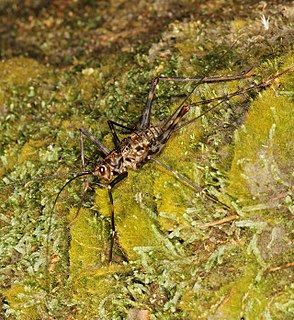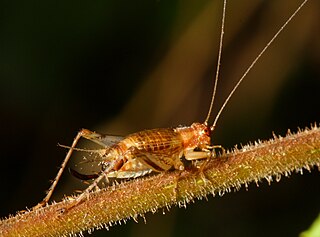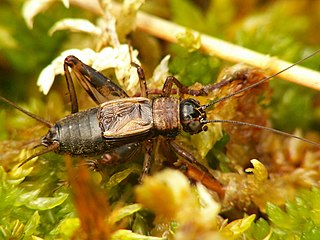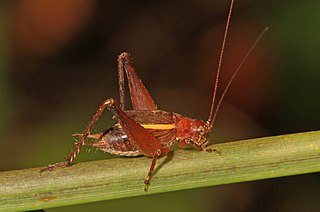
Gryllinae, or field crickets, are a subfamily of insects in the order Orthoptera and the family Gryllidae.

Tree crickets are insects of the order Orthoptera. These crickets are in the subfamily Oecanthinae of the family Gryllidae. This subfamily contains nine genera.

Phalangopsinae, occasionally known as spider crickets, are a subfamily of crickets in the family Phalangopsidae. Members of Phalangopsinae are found worldwide in tropical and subtropical regions. Most species in the subfamily are nocturnal and can be found in rocky areas, near fallen wood, and the understory of forests. Some species are gregarious, gathering in large numbers.

The Eneopterinae are a subfamily of crickets, in the family Gryllidae, based on the type genus Eneoptera. It is one of several groups widely described as "true crickets". Of the more than 500 species that make up this subfamily, most occur in moist, tropical habitats. These insects are medium to large and brown or gray in color. They eat plant leaves, flowers, and fruits and can occasionally cause economic damage. Their eggs are deposited in pith, bark, or wood. Eneopterinae show a great diversity in stridulatory apparatus, signals emitted, and associated behaviour.

Anaxipha is a genus of brown sword-tail cricket from tropical areas in the Americas, Africa, Asia, Australia and western Pacific islands.

Nemobiinae is a subfamily of the newly constituted Trigonidiidae, one of the cricket families. The type genus is Nemobius, which includes the wood cricket, but members of this subfamily may also be known as ground crickets or "pygmy field crickets".
Absonemobius is a genus of South American crickets in the subfamily Nemobiinae.
Hygronemobius is a genus of insect in family Gryllidae.
Gymnogryllus is a genus of crickets in family Gryllidae and tribe Gryllini. Species are recorded from Africa, Asia and Australia.

Homoeogryllus is a genus of cricket in the subfamily Cachoplistinae and tribe Homoeogryllini. The recorded distribution is: Africa and Peninsular Malaysia.

Hapithinae is a subfamily of insects in the cricket family Gryllidae. It is one of several groups referred to in American English as "bush crickets", although this term can be confused with the Tettigoniidae.

Podoscirtinae is a subfamily of crickets in the family Gryllidae.

The Trigonidiidae are a family of crickets: Grylloidea consisting of two subfamilies:

Ripipterygidae is a family of insects in the order Orthoptera. Members of the family are commonly known as mud crickets.

The Gryllotalpoidea are a superfamily of insects that includes the mole crickets and the ant crickets. The type genus is Gryllotalpa.

The Phalangopsidae are a recently reconstituted family of crickets, based on the type genus PhalangopsisServille, 1831 from South America. Priority for family-group names based on this genus dates from Blanchard's "Phalangopsites".
The Phaloriinae is a subfamily of crickets of the family Phalangopsidae. Species are terrestrial and are distributed in: Africa, tropical Asia, Korea, Australia and the Pacific Islands.
Aphonomorphini is a tribe of crickets in the subfamily Hapithinae. There are about 6 genera and more than 90 described species in Aphonomorphini.

Gryllini is a tribe of crickets and typical of the family Gryllidae. Species are terrestrial, carnivorous or omnivorous and can be found in all continenents except Antarctica.
Lepidogryllus is a genus of crickets, sometimes known as mottled field crickets, in the family Gryllidae and tribe Modicogryllini. Species have been found in Australia and Vietnam.












